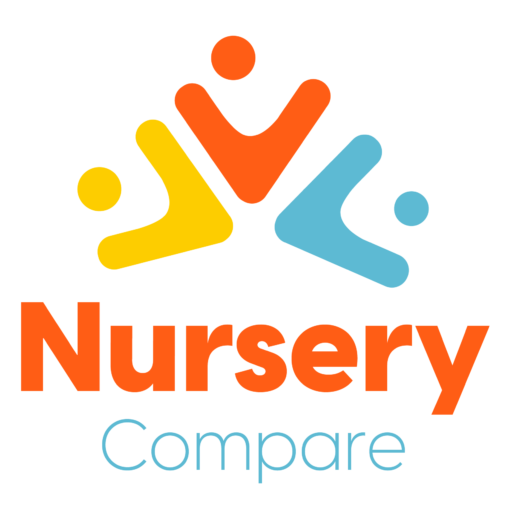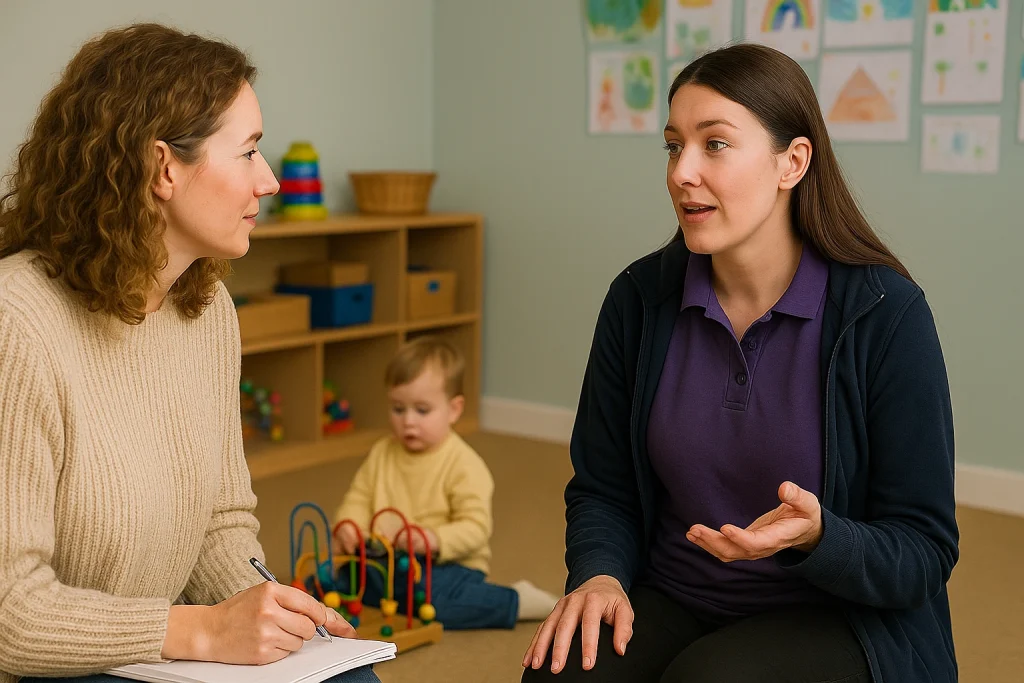
30 Questions to Ask a Nursery in the UK (Before You Say “Yes”)

Choosing a nursery is a big call. You’re not just picking a place; you’re choosing a team who’ll help shape your child’s early years. The easiest way to feel confident is to arrive with smart, UK-specific questions — and to listen to your gut on the visit.
Below is a parent-friendly checklist that pulls together the most useful questions from what’s already ranking (community tips, provider checklists, and expert guidance), refined for clarity and real-life decision-making.
Quick win: Shortlist and compare settings side-by-side on NurseryCompare, then take this list with you to each visit.
If you’re not sure where to start, it helps to see a real example. Take a look at Purple Bees Day Nursery — their profile shows fees, photos, Ofsted rating, and parent feedback all in one place.
You can then browse other nurseries near you and start comparing what each one includes.
1) Start with the essentials (fees, hours, availability)
- What are your opening hours and term dates?
Some settings are term-time only; others run all year (often 7:30–18:00). - Do you have space for our preferred start date and number of sessions?
Great nurseries can book up months ahead. - How much does it cost — and what’s included?
Clarify meals, snacks, nappies, wipes, outings, sun cream. - Do you charge for bank holidays, sickness or holidays?
Policies vary widely; it affects your actual monthly cost. - Do you offer funded hours and Tax-Free Childcare — and how are they applied?
Ask how 15/30 hours are scheduled and whether there are “extras”.
Use NurseryCompare filters to spot opening hours, fees and funding at a glance. 👉 Start your shortlist
2) Staff, ratios & stability (who cares for your child daily)
- What are your staff-to-child ratios by age?
EYFS guide: Under 2s 1:3 • 2–3 yrs 1:5 • 3+ yrs 1:8 (or 1:13 with a qualified teacher). - What qualifications and training do staff hold?
Look for Level 2/3 Early Years Educators + regular paediatric first-aid refreshers. - What’s staff retention like?
Consistency matters; high turnover is often felt by children. - Will my child have a key person? How often will we speak to them?
This relationship underpins your child’s confidence and your peace of mind. - How do you recruit and vet staff?
Enhanced DBS checks, references and safer recruitment are non-negotiables.
3) Daily life, learning & the EYFS (what actually happens)
- What does a typical day look like for my child’s age group?
Balance of child-led play, small-group time, outdoor time and rest. - How do you support learning and “school readiness”?
Ask how they cover all EYFS areas (communication, physical, personal/social, literacy, maths, understanding the world, arts). - What enrichment do you offer?
E.g., music, yoga, languages, STEM, forest/ outdoor learning. - How do you adapt activities for different needs or stages (SEND, EAL, speech delay)?
- How do you track and share progress?
Apps like Famly/Tapestry, termly reports, parent evenings — and examples of the kind of updates you’ll receive.
4) Food, sleep & practical care (comforts that make or break the week)
- Are meals and snacks provided? Can I see a recent menu?
Check food hygiene rating and allergy processes. - How are weaning and fussy eating handled?
Ask about spoon vs baby-led, alternatives, and staff approach. - Where do children nap, and what’s the sleep routine?
Dedicated sleep room vs mats; how they support non-nappers or short nappers. - How often do children go outside?
Daily access (whatever the weather) is a good sign; look for shade and safe space. - Can my child bring comfort items? What’s the policy on bottles/dummies?
5) Safeguarding, health & behaviour (your safety questions, answered)
- How secure is entry/exit? What’s the pick-up procedure for new people?
Buzzers, sign-in systems, photo IDs — be specific. - Are all room staff paediatric first-aid trained?
Nurseries with Millie’s Mark meet a gold standard. - What happens if my child is unwell or has an accident?
Recording, notification and escalation steps. - How do you support positive behaviour?
Ask how they handle biting, conflict and big feelings for under-5s. - How is nappy changing managed and supervised?
You’re entitled to clear, transparent processes.
6) Communication, flexibility & culture (the “feel” you can’t see on paper)
- How will you keep me updated during the day?
Photos, messages and quick notes can make settling easier. - How flexible are sessions if our work pattern shifts?
Extra sessions, swaps and notice periods matter in real life. - How are transitions handled?
Moving rooms, settling-in plans, and the eventual step to school. - How are parents involved?
Stay-and-play, workshops, feedback loops and community events. - What does your Ofsted report highlight — and what have you improved since?
Great managers love this question; it reveals mindset and momentum.
Want to get a feel for how nurseries present themselves online? Have a look at Purple Bees Day Nursery — it’s a good example of how transparent settings can be with parents.
Once you’ve seen one, you’ll naturally start spotting the details that matter most when you search for nurseries in your area.
A quick word on “the vibe” (your instincts count)
Most providers will give similar answers on paper. The tie-breaker is the feeling in the room:
- Are children engaged and relaxed?
- Do staff get down at eye level, use names, and genuinely connect?
- Does the manager welcome questions — even the tricky ones?
If you’re torn between two, visit again (ideally at a busier time) and notice your child’s reactions.
One-page checklist (save this on your phone)
- Hours & term dates ✔️ Fees & what’s included ✔️ Bank holidays/absence policy ✔️ Funded hours applied ✔️
- Ratios by age ✔️ Staff qualifications & retention ✔️ Key person ✔️ Vetting ✔️
- Typical day ✔️ Enrichment ✔️ SEND support ✔️ How progress is shared ✔️
- Menu & allergies ✔️ Weaning/fussy eating ✔️ Nap routine & sleep space ✔️ Outdoor time ✔️
- Entry security ✔️ First-aid ✔️ Illness/accident process ✔️ Behaviour approach ✔️ Nappy changing ✔️
- Daily updates ✔️ Flexibility ✔️ Room/school transitions ✔️ Parent involvement ✔️ Ofsted + improvements ✔️
👉 Build your shortlist on NurseryCompare and book visits directly from profiles.
Helpful examples to click next
- See how a real nursery presents itself: Purple Bees Day Nursery
- Then compare 3–5 nearby settings and book two visits each.
- Take notes using the checklist above — it keeps choices objective when everything blurs together.
FAQ: Questions to Ask a Nursery (Parent-to-Parent Advice for the UK)
1) What are the most important questions to ask when choosing a nursery in the UK?
– “What are your opening hours and holiday closures?”
– “What’s included in the fees — meals, nappies, trips?”
– “Who will look after my child and how qualified are they?”
– “How do you make sure children are safe and settled?”
You can tell a lot by how openly a manager answers. For reference, explore how nurseries list inclusions and costs on NurseryCompare.
2) What should I ask when visiting a nursery for the first time?
– “What does a normal day look like for this age group?”
– “Can I see the sleep area and outdoor space?”
– “How do you communicate with parents during the day?”
While you walk around, notice if children are relaxed and staff are at their level. These small details speak volumes. You can save and compare your favourite nurseries later on NurseryCompare.
3) What questions should I ask about learning and development?
A great nursery will light up when talking about children’s progress. It’s fine to ask for a peek at a learning journal or how their daily updates look.
4) What should I ask about food, naps and daily routine?
– “Are meals freshly cooked on site?”
– “Can I see a sample menu?”
– “Where do babies nap and how is that monitored?”
– “Do you go outside every day — even in winter?”
If your little one is a fussy eater or a short napper, mention it and see how flexible the staff sound. You’ll feel calmer knowing they truly get it.
5) What are good safeguarding questions to ask a nursery?
– “Who’s your Designated Safeguarding Lead?”
– “Do all staff have DBS checks?”
– “What’s your procedure for someone new collecting my child?”
Good nurseries answer confidently and clearly. You can also check Ofsted ratings on pages like Purple Bees Day Nursery.
6) What should I ask about staff ratios and experience?
When people stay, children feel that continuity.
7) What should I ask about communication with parents?
You can filter for transparency and reviews when browsing on NurseryCompare.
8) What should I ask about fees and funding?
Some list optional extras (clubs, food during funded hours). Compare the monthly reality, not just the hourly rate, by checking multiple listings on NurseryCompare.
9) What should I ask about settling-in sessions?
You’re looking for patient and child-led.
10) What are red flags when visiting a nursery?
11) What’s a thoughtful final question before choosing?
The best answers sound specific, proud and people-centred.
12) How can I compare nurseries after visiting them?
13) What questions do parents often forget to ask?
These small things show how smoothly a nursery runs when it’s just a regular Tuesday.
14) What’s the best way to prepare before nursery visits?
15) What’s the single best question to ask at a nursery visit in 2025?
You’ll hear everything you need in their tone, examples and pride.